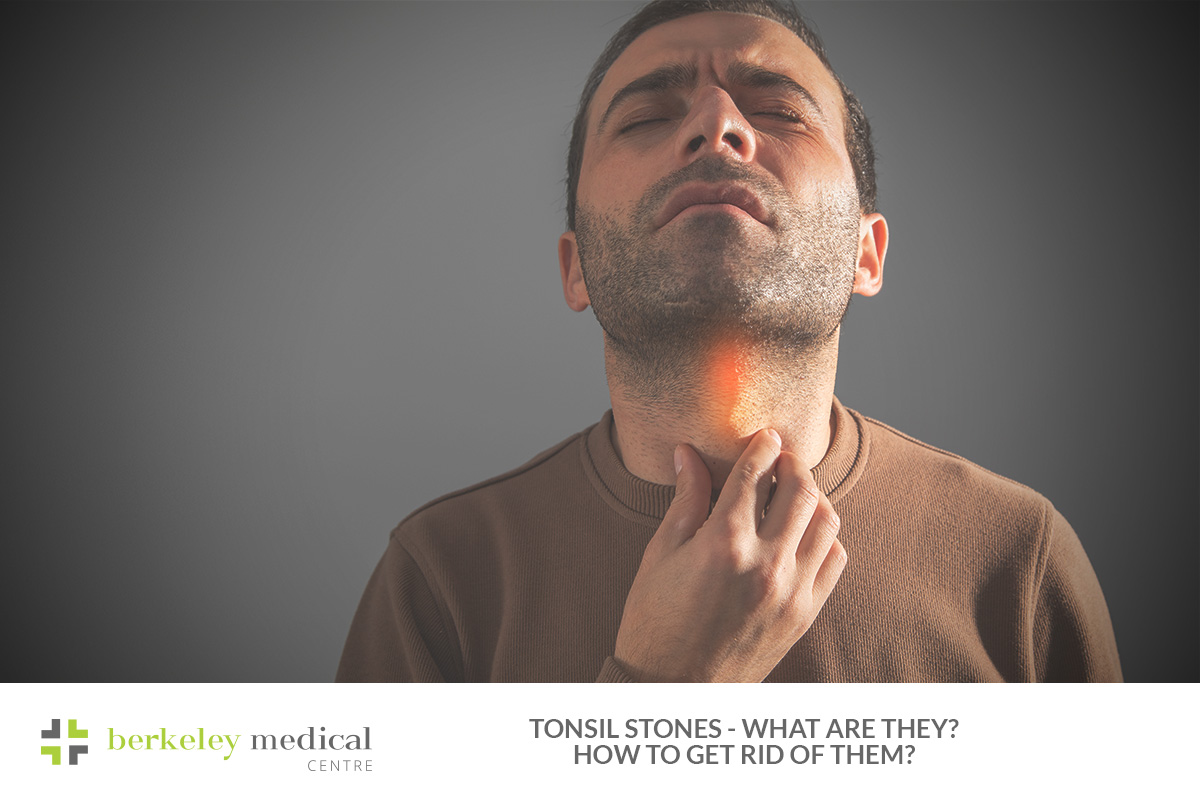Tonsil stones might not be a common topic of conversation, but they affect more people than you might think. If you have ever experienced a sore throat that comes and goes, persistent bad breath, or the sensation of something stuck in your throat, you could have tonsil stones.
At Berkley Medical Centre, we help patients understand and manage conditions like tonsil stone and throat infections with medical advice. In this guide, we will explain what tonsil stone are, why they form, who is at risk, how to remove them and how to prevent them from coming back.
What Are Tonsil Stones?
Tonsil stones (also called tonsillitis) form when food particles, bacteria, dead cells and mucus get trapped in the small crevices (crypts) of the tonsils. Over time, this trapped debris hardens into small, stone-like formations.
How Tonsil Stone Vary:
- Size – Some are too small to see, while others grow as large as a small pebble.
- Texture – Some stay soft, while others harden and calcify.
- Duration – Some disappear within days, while others persist for weeks.
- Frequency – Some people develop them regularly, while others only get them occasionally.
Even with excellent oral hygiene, you can still develop tonsil stone, but some habits increase your risk.
How Common Are Tonsil Stones?
You have probably heard of kidney stones and gallstones, but tonsil stones are much more common. Studies suggest that up to 40% of people will experience tonsil stones at some point in their lives. Unlike kidney or gallstones, tonsil stone rarely cause serious health problems, but they can lead to discomfort, bad breath and throat irritation.
Symptoms of Tonsil Stones
Many people do not realise they have tonsil stone because they do not always cause noticeable symptoms. However, when symptoms do occur, they often include:
- Persistent bad breath (halitosis) caused by bacteria trapped in the stones
- A sore throat or a constant feeling of something stuck in your throat
- Difficulty swallowing or mild discomfort while eating
- Coughing as your body tries to expel the stones
- Frequent throat infections or ongoing throat irritation
If you experience these symptoms regularly, tonsil stone may be the cause and you may need to take steps to manage or prevent them.
Who Is More Likely to Get Tonsil Stones?
Anyone with tonsils can develop tonsil stone, but some people are more prone to them than others. You have a higher risk of developing them if you:
- Have deep crypts or irregularly shaped tonsils
- Smoke regularly
- Drink sugary drinks, which encourage bacterial growth
- Have poor oral hygiene
- Have a family history of tonsil stone
If you experience recurring tonsil stones, focusing on oral hygiene and lifestyle changes can help reduce your risk.
How to Get Rid of Tonsil Stones
The best way to treat tonsil stones depends on their size and whether they cause symptoms.
- No symptoms? No treatment needed. Many tonsil stones go away on their own.
- Mild symptoms? Gargle with salt water. This can loosen small stones and reduce bacteria.
- Larger stones? Try a cotton swab or water flosser. Gently dislodging the stones can help, but avoid using sharp objects like toothpicks, which can cause injury.
- Infected or swollen tonsils? Your doctor may prescribe antibiotics or anti-inflammatory medication. These can help with infection and inflammation, but would not prevent new stones from forming.
If tonsil stones continue to cause problems, you may need to consider long-term solutions.
When Is Surgery Necessary for Tonsil Stone?
Doctors rarely recommend surgery for tonsil stone, but in severe cases, it may be the best option. If you experience chronic tonsil stone, frequent infections, or severe discomfort, your doctor may discuss:
- Tonsillectomy – A procedure to remove the tonsils completely, preventing stones from forming.
- Cryptolysis – A less invasive procedure that smooths out the deep pockets in the tonsils where stones develop. This can be done with lasers or radio waves.
Most people do not need surgery, but if tonsil stone affect your quality of life, a doctor can help you explore treatment options.
How to Prevent Tonsil Stone from Coming Back
You cannot always prevent tonsil stone, but following good oral hygiene habits can reduce your risk.
Ways to Reduce the Risk of Tonsil Stones:
- Brush your teeth and tongue twice a day to remove food particles and bacteria.
- Floss daily to prevent bacteria build up in your mouth.
- Gargle with salt water after meals to clear out debris from your throat.
- Limit sugary foods and drinks, as sugar encourages bacterial growth.
- Avoid smoking and vaping, as they irritate and inflame the tonsils, increasing the risk of stone formation.
If you frequently experience tonsil stone, speak to a GP about further prevention methods.
The Bottom Line
Tonsil stone are far more common than most people realise. While they rarely cause serious health problems, they can be uncomfortable, irritating and contribute to persistent bad breath.
By maintaining good oral hygiene, using saltwater gargles and limiting sugar intake, you can reduce your chances of developing tonsil stone. If they continue to be a problem, medical treatments like cryptolysis or a tonsillectomy may be necessary.
At Berkley Medical Centre, we provide advice, diagnosis and treatment for tonsil stone, throat infections and other health concerns.
If tonsil stones are affecting your quality of life, it may be time to seek professional advice.
Tonsil stones should not be a mystery—now that you know what they are, share this information with others!







